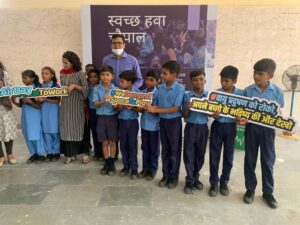Team L&M
The clean air movement in India is increasingly moving from an elite, masks-and-purifiers driven conversation, to one that fully understands the burden of air pollution on the poorest and most vulnerable population. In Gurugram, the poor, mostly migrant labourers from rural areas of Bihar and Bengal, are not only bearing the brunt of pollution from industry, traffic and construction, but also increasingly cannot afford clean cooking options in their homes with skyrocketing prices of LPG cylinders.
Women, in particular, are realising the high costs of air pollution, especially the long-term health effects for themselves and their children. Household air pollution causes 600,000 deaths per year, disproportionately affecting the health of women and children in India. Domestic biomass burning also causes up to 40per cent of air pollution during peak winter months in North India.

“I cannot protect my children from air pollution until each and every mother takes up the battle to protect each of their children,” says Dr Sarika Verma, ENT surgeon and Secretary, IMA Gurgaon.
In the urban village of Sikanderpur, Gurugram, 300+ women and children gathered for UN International Day of Clean Air for Blue Skies on September 7, 11am at the local community centre. On the agenda was a discussion of air pollution and possible local solutions to the problem. In particular, solutions that at once address the larger air pollution problem and more importantly the acute exposure to smoke faced daily by women and children as they sit at wood-burning chulhas to cook food and warm themselves. A talk by a doctor, several street plays and performances on the topic, a documentary screening and a photo exhibit were held
In a small micro study, 10 families (currently using chulhas) were given induction stoves and pressure cookers. After a one-on-one workshop, four households completely eliminated chulhas while others reduced chulha usage to a significant degree.
“Any fight for clean air must start with, and be led by, the most vulnerable women and children, those who are affected not just by poor air, but also fumes of chulhas at home” Sherebanu Frosh, Warrior Moms
The community in Sikanderpur has been organised by NGO Agrasar, who currently runs a school and several women’s empowerment groups. Raahgiri foundation and Warrior Moms are helping with the study, and future interventions, while Sustainable Mobility Network is supporting the event.
“We work closely with the women and children of Sikanderpur, and they have time and again expressed frustration at the unaffordability of clean cooking options,” says Prerit Rana, Agrasar.
“I am so happy to see that such a complex and invisible issue like air pollution is gaining traction among masses,” adds Sarika Panda, Raahgiri foundation.